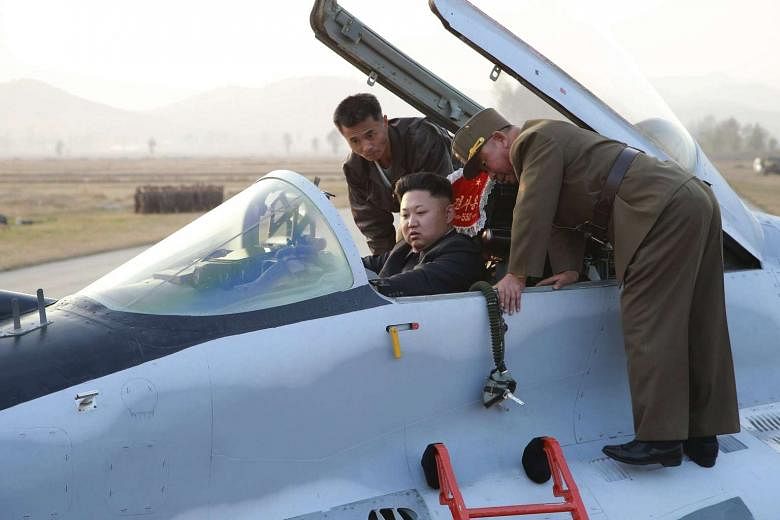SEOUL (AFP) - North Korea warned early on Saturday that it was prepared to risk "all-out war" as leader Kim Jong-Un put his front line troops on combat readiness to back up an ultimatum for South Korea to halt propaganda broadcasts across the border.
The warning came as military tensions on the divided Korean peninsula soared following a rare exchange of artillery fire on Thursday that put the South Korean army on maximum alert.
"Our military and people are prepared to risk an all-out war not just to simply respond or retaliate, but to defend the system our people chose," North Korea's foreign ministry said in a statement on the official KCNA news agency, according to the South's Yonhap news agency.
"The situation has reached the verge of war and can no longer be reversed."
Technically, the two Koreas have been at war for the past 65 years, as the 1950-53 Korean conflict ended with a ceasefire that was never ratified by a formal peace treaty.
Kim has given similarly bellicose orders in the past, most recently in 2013 when he declared "a state of war" with the South, although no clashes resulted.
Over the decades, South Koreans have become accustomed to the North's provocative and belligerent behaviour, and there was no sense of public panic in Seoul despite the dire threats.
Kim chaired an emergency meeting late Thursday of the North's powerful Central Military Commission (CMC) which endorsed the ultimatum for the South to switch off its propaganda unit loudspeakers by Saturday afternoon or face military action.
South Korea's defence ministry insisted the loudspeakers would keep operating.
KCNA said Kim ordered frontline, combined units of the Korean People's Army (KPA) to "enter a wartime state" from Friday at 5pm (4pm Singapore time).
The troops should be "fully battle ready to launch surprise operations" while the entire front line should be placed in a "semi-war state", KCNA quoted him as saying.
'RECKLESS ACTS'
In response, the South Korean Joint Chiefs of Staff urged the KPA to refrain from any "reckless acts".
South Korean television broadcast images of President Park Geun-Hye wearing army fatigues as she addressed a meeting of top military commanders outside Seoul.
"Any provocations by North Korea will not be tolerated," Park told the gathering.
The United States urged Pyongyang to avoid any further escalation, with the Pentagon stressing it remained firmly committed to defending ally South Korea.
UN chief Ban Ki-moon urged both sides to "refrain from taking any further measures that might increase tensions" and China urged "relevant parties to remain calm and restrained".
Direct exchanges of fire across the inter-Korean land border are extremely rare - mainly, analysts say, because both sides recognise the risk of a sudden and potentially disastrous escalation.
But Yoo Ho-Yeol, a professor of North Korean studies at Korea University in Seoul, said although previous episodes of tense brinkmanship had not escalated into conflict, this could not be ruled out.
"We've been here before several times, but that doesn't mean it isn't still dangerous," said Yoo said.
"There's a real possibility of this confrontation leading to some sort of armed clash."
The last direct attack on the South was in November 2010 when North Korea shelled the South Korean border island of Yeonpyeong, killing two civilians and two soldiers.
Seoul said Thursday's artillery exchange was triggered by North Korea firing several shells in the rough direction of one of its border propaganda units.
The South responded by firing "dozens" of 155mm howitzer rounds.
Nearly all the shells from both sides landed in their respective halves of the demilitarised zone (DMZ), a 4km-wide buffer zone that straddles the actual frontier line.
RISING TENSIONS
Tensions were already on high-simmer before the shelling, following mine blasts that maimed two members of a South Korean border patrol this month and the launch Monday of a major South Korea-US military exercise that infuriated Pyongyang.
Seoul said the mines were placed by North Korea and responded by resuming the high-decibel propaganda broadcasts after more than a decade.
Meanwhile, the Unification Ministry in Seoul, which oversees cross-border affairs, announced it was restricting access to the North-South's joint industrial zone at Kaesong.
Only South Koreans with direct business interests in Kaesong - which lies 10 kilometres inside North Korea - would be allowed to travel there, a ministry spokesman said.
The Kaesong industrial estate hosts about 120 South Korean firms employing some 53,000 North Korean workers and is a vital source of hard currency for the cash-strapped North.
Restricting access will likely be seen as a thinly veiled threat by Seoul to shut the complex down completely if the situation at the border escalates further.

